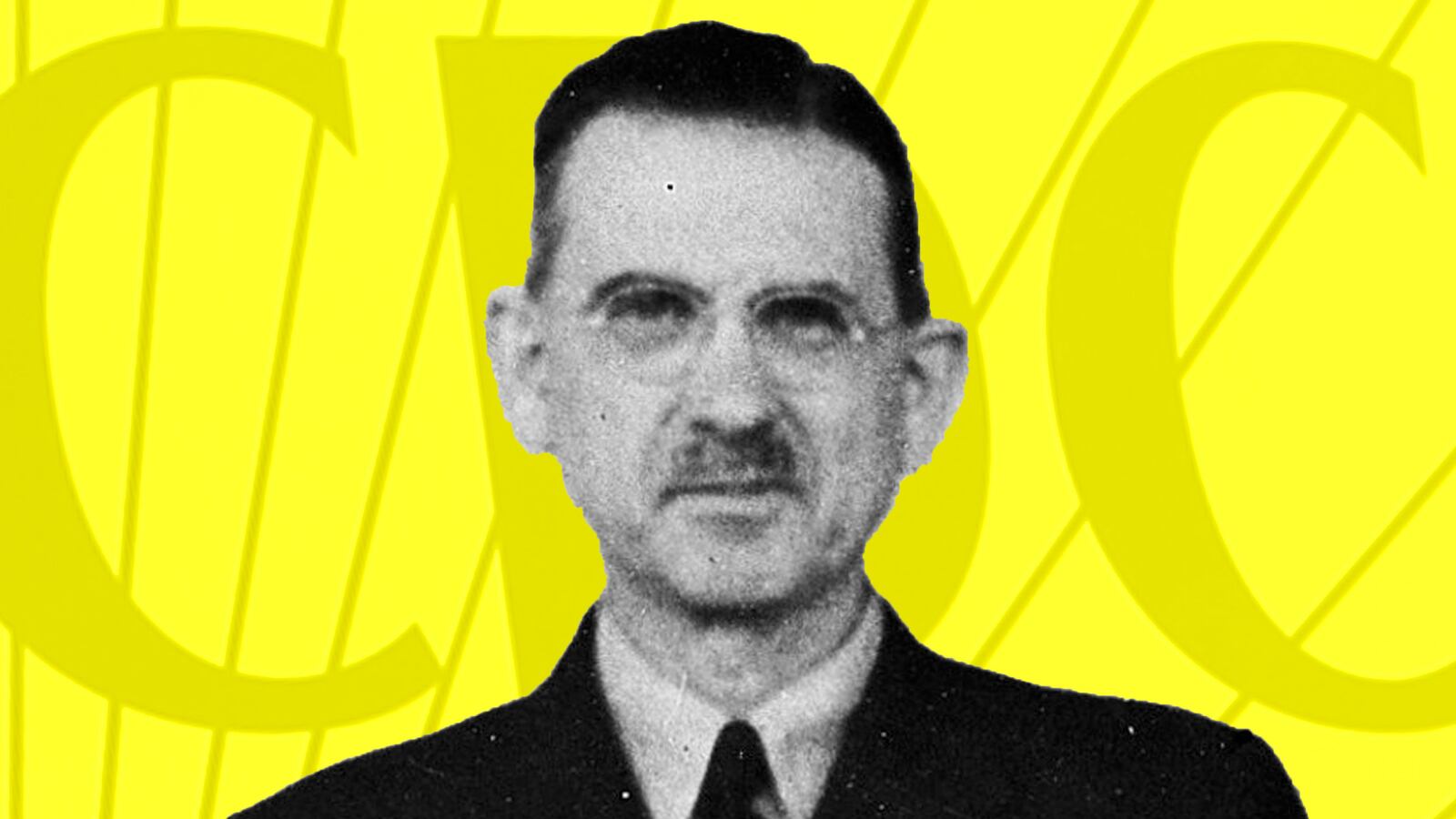President Donald Trump’s war against the Centers for Disease Control and Prevention is escalating. A recent administration email accused the CDC of “undermining the President.” Trump’s contempt marks a dramatic break for this widely respected organization. Traditionally, Republican and Democratic presidents alike have treated the CDC as a neutral do-gooding agency, not a political piñata—what Bill Clinton called “our first line of defense against disease, injury, and disability.”
Surprisingly, this important agency was not founded as part of some top-down presidential initiative. Instead, Dr. Joseph Mountin—a little-known American medical prophet who didn’t care about medical profits—pushed and pushed to convince his fellow citizens that only an agency with national reach and international scientific credibility could coordinate the necessary federal and state efforts needed to keep Americans healthy.
Back in 1946, Mountin founded the CDC—today’s Centers for Disease Control and Prevention—to shift America from reactive medicine, or treatment, to preventive medicine, or nurturing public health. His is a 1940s-story involving Coca-Cola, malaria, and World War II’s massive mobilization. It’s also a timeless American story about juggling instant gratification and long-term investment, federalism and nationalism, medical science with public health, and the wealthiest Americans’ access to the best doctors with every American’s desire for quality care.
Dr. Joseph Mountin called himself “a simple Wisconsin farm boy, born in the shadow of a silo,” in 1891 in Hartford, 40 miles northwest of Milwaukee. Although Mountin’s family was financially stable, most farmers were dirt poor—and knee-deep in grime. Epidemics were not once-in-a-lifetime surprises but routine events. One of seven children, when Joseph was 4, he and his 5-year-old brother Ned caught diphtheria. Ned died.
Mountin left his provincial bubble to study at Marquette University. Earning his MD in 1914, he then interned in Milwaukee and Chicago, prepping for a career as that most respectable, non-boat-rocking, establishment pillar, a Midwestern doctor.
America’s entry into World War I rocked his world, expanding his thinking, nationalizing his perspective. By the time he died suddenly in 1952, he was, Dr. Milton I. Roemer of UCLA writes, 20th century America’s “greatest architect of public health.”
Mountin began as a scientific assistant at the United States Public Health Service in August, 1917. As military camps popped up in Louisville, Des Moines, Waco, and elsewhere, the young doctor kept the bases and their surroundings sanitary and disease-free. Over the next three decades, Mountin held various Public Health Service jobs which sounded stiff and bureaucratic, serving as assistant surgeon general in 1918 to working with the Missouri, then the Tennessee Health Departments throughout the 1920s, to heading the Bureau of State Services by the 1940s.
Refusing to be an administrative drone, Mountin turned his assignments into launching pads. He insisted on treating the body politic, not just the body. America’s catch-as-catch-can network of doctors and hospitals had to become an effective, equitable national system protecting Americans from dirt and disease, maximizing prevention and perfecting treatment. Typically, his first of nearly 200 papers, in 1925, analyzed “Preventive Medicine in Private Practice.”
Mountin was frustrated that “in one very essential field—namely, organization—medicine has not kept pace with its own scientific advancement” or with America’s “social and economic changes.” He kept encountering a still-familiar problem, the “divided responsibility and lack of uniformity” on “federal, state, and local relationships for both routine and special demands.”
Delivering challenging speeches asking: “Medical Care: A Private Enterprise or a Social Service?” Mountin, the medical statesman, understood public health as “resting on the joint pillars of natural science and social science.” While seeking vaccines and treatments, medical professionals needed to think three-dimensionally too: fighting epidemics pre-emptively with improved hygiene; democratizing health delivery systems; asking how Americans could afford these treatments; and coordinating information, intelligence, strategies, and resources on a national scale.
Mountin had the reformer’s restless, unbounded, visionary kind of mind. As a professorial activist, his democratic weapon of choice was the academic study. When assessing the health care system nationally, he made headlines with a study showing the rich enjoyed easier access to hospitals and medical care. When evaluating a particular health department’s performance, rather than starting with its internal numbers, he surveyed families, asking what services they received. This breakthrough method became standard practice. And when examining the quality of medical life individually, he noted that no budget can ever anticipate what a disease or injury will cost. The only solution was “a pooled fund derived from taxation or insurance,” better known as national health insurance.
This mid-century nationalist, believing in postwar-America, sought “mechanisms for cooperation among all public agencies involved in health and medical service.” His slogan, one contemporary wrote, was “let the welfare of the people be the supreme law.”
All these surveys, insights, and passion, shaped his greatest coup, becoming the “father” of the CDC. In the early 1940s, malaria still menaced the South, which housed many army bases. The massive number of troops drafted, and their close quarters, made fighting this disease a national security priority. Directing the States Relations Division of the Public Health Services, Mountin supervised the World War II Malaria Control in War Areas program—getting entomologists and engineers to work with physicians. They established their headquarters in an epicenter of epidemics and the capital of the New South, Atlanta. After the war, Mountin again pushed hard and thought wide, morphing the malaria center into the Communicable Disease Center on July 1, 1946.
Coca Cola’s legendary leader—and a generous Emory University benefactor—Robert Woodruff, had seen malaria’s devastating impact during his frequent trips to his 30,000-acre quail-hunting plantation in Georgia, Ichauway. Thanks to him, the CDC bought 15 acres from Atlanta’s Emory University for 10 dollars. CDC’s main headquarters still sits there today.
Over the years, the CDC has come closer to fulfilling Mountin’s vision as “the Nation’s Prevention Agency.” By 1970, it became the Center for Disease Control, and in 1992, the Centers for Disease Control and Prevention.
Forever pushing so many iconoclastic positions, Mountin was not an easy person. According to his colleague, Dr. Hugh Leavell, “Mountin was recognized for his vision and his passion for facts. Never satisfied with the status quo,” he “not infrequently trod on the toes of those content to look backward rather than forward.”
Mountin died suddenly at the age of 61, short of his goal of seeing “complete coverage of the country by full-time professionally staffed health units.” But, the surgeon general from 1936 to 1948, Thomas Parran wrote, “During his lifetime,” Mountin saw the diptheria that killed his brother “conquered,” as the U.S. “advanced from an epidemic-ravaged, unsanitary country to one which is among the nations having the highest standards of health and productivity.”
Eulogizing Mountin, Parran noted that “Many of the practices he championed years ago are now taken for granted,” including the synthesis of medicine and public health. Hailing his prickly, passionate, and prescient friend, Parran proclaimed that despite lacking an MPH degree, Dr. Joseph Mountin “was in the fullest sense a master of public health.”






